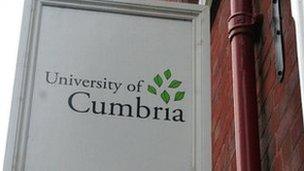Cumbria tuition fee rise attacked by Campbell-Savours
- Published
- comments
During my journalistic youth (which I kid myself I'm still in) I remember the long running campaign to get a university for Cumbria.
The man who blazed a trail for it was the then Workington MP Dale Campbell-Savours, external.
His vision was for a "University of the Lakes", external which could prevent the brain drain of bright young things from a county which couldn't offer them any higher education.
More than 15 years on, his dream is very much a reality. The University of Cumbria, external now has 13,000 students enrolled in everything from forestry to photography.
But Lord Campbell-Savours is less happy about the University's plans to charge £8,400 for fees from 2012.
Although Cumbria has decided not to go for the maximum £9,000, he says he was taken aback when he found out how much it planned to charge.
Government funding
He believes it's a mistake, and will put off the kind of Cumbrian students he always hoped would benefit from the idea.
He told me: "To be frank I was astonished. I'd have thought in Cumbria we would have produced a far more economic package, combining tuition and accommodation to attract people not just from Cumbria but from overseas. It's not a decision I would have made."

The University of Cumbria says it needs to charge higher fees to fund courses properly
The University though says it's confident it has made the right call. Pro Vice-Chancellor Professor Sandra Jowett, external says it needs to replace the large amounts of government funding its lost.
She believes an £8,400 fee is essential to ensure the University can maintain the quality of its teaching, and ensure it offers students high quality courses.
But of course there is a risk involved for every university setting a fee.
Set it too low and you miss out on vital revenue. Set it too high and you could suffer from a drop in applications.
Financial difficulties
Judging by the figures, Cumbria is currently seeing an increase in applications. You have to suspect some of those are keen to enrol this autumn to avoid the £8,400 fee which will come in next year.
The university hasn't been without its problems during its first few years.
It was plagued by financial difficulties and bad headlines for some time, although it is now expecting to make a profit this year.
Being so new, it also has less of a reputation to fall back on.
It also currently attracts an above average number of students from lower socio-economic groups.
So it will no doubt be watching the level of applications for 2012 keenly to see if it has set them at the right level.
But Lord Campbell-Savours is convinced that the University he campaigned for - and higher education in general - will be badly damaged by the decision to charge students much more than in the past.